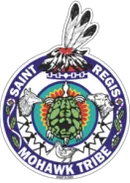Threat to Black Ash Trees also Threatens Mohawk Basket Traditions
The St. Regis Mohawk Tribe’s Environment Division has applied for and received funding from the National Endowment for the Humanities (NEH). The grant will support work that will assess historical collections relating to black ash basketry and to develop long-term plans for preservation of documents. In addition to the assessment and preservation efforts, the project will deliver a workshop on the topic of collections storage.
The Emerald Ash Borer (EAB), an invasive species of beetle, targets ash trees and is endangering the North American population of ash trees. The black ash tree is particularly important to the culture and history of northern woodland tribes, including the Mohawk Tribe. These tribes have a long-standing tradition of making baskets and other items from the black ash tree. Many of these items have found their way into collections and museums, including the Smithsonian. Tribes and universities are studying ways of fighting the EAB and preserving stands of black ash trees.
The process of making black ash baskets is arduous. Since the trees tend to grow in wet areas, they are generally harvested in the winter, when they can be skidded out more easily over the ice. A chip is cut out of the tree before harvesting since trees are selected based on their moisture content. Once the tree is selected, it is harvested and the trunk used to make splints. The splints come off the trunk when it is pounded with a sledgehammer or the backside of an axe. The splints are then run through a jig to ensure uniformity, soaked (and sometimes dyed) and woven into baskets.
“I will be donating 20 years of documents to our library. This includes photographs and correspondence that I have accumulated while working with the Akwesasne Task Force on the Environment (ATFE) on black ash,” remarked Les Benedict, Assistant Director of the Environment Division. “This will make black ash information more widely available to the community and to other researchers.” Being able to house these records will prevent their loss and/or damage and will ensure the information is available into the future. Sue-Ellen Herne, Akwesasne Museum Program Director will also be working on this endeavor.
# # # #
Any views, findings, conclusions, or recommendations expressed in this press release do not necessarily reflect those of the National Endowment for the Humanities
For more information: David T. Staddon, Director Public Information, Tel: (518) 358-2272 ext. 286.

